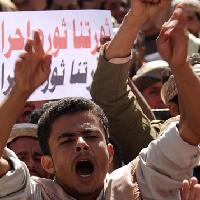
Public sector workers join growing movement
On Friday 4 March, four million people protested against President Ali Abdullah Saleh’s regime in cities all over Yemen. Protesters in Sanaa, Aden and Taiz, have started camping in the major squares. The one common demand is, ‘Down with the regime!’
In the middle of Mareb city, a palm tree was planted by protesters, with people saying, “We stay until the president has left or until we eat the dates of this palm”. Mareb has been accused by the regime of being a “centre of heavy armed tribes” and “al-Qaeda supporters”. In another city, Alhabilien, heavy artillery bombed the city for a month now, with regime accusations of al-Qaeda links in the area as the pretext for these brutal attacks. As in Alhabilien, armed forces have now been withdrawn from Mareb, for unknown reasons. The last time this happened, in the south of Yemen, air strikes followed, which killed many civilians.
On Sunday, 6 March, in Ibb, more than 40 people were badly injured, stabbed by knives and beaten by batons by thugs from the president’s party. Thousands of people travelled to Ibb after this attack to join the mass movement.
In the last week, workers publicly participated in the protest movement. Workers from the Institute of Water and Sanitation carried a huge banner on the demonstration on Monday 7 March, which read: “No to arbitrary measurements…No to the destruction of the future of water [resources] in Yemen”. The workers demanded the head of the Institute, who is from the president’s ruling party, resign or the workers will join the mass movement. Water resources are a huge problem facing Yemen. The UN estimates that Sanaa will be the first capital city in the world without water by 2016.
Public sector cleaning workers are also taking protest action. They have been on strike since the ‘Tuesday of Anger’, on 1 March, over working without contracts and the chaos created by pro-government thugs occupying Tahrir Square in the capital. In contrast to Cairo, the Tahrir Square in Sanaa is occupied by pro-government forces, while the mass opposition protests take place in front of the capital’s university. This coming Friday, Tawkul Karman, a well-known leader of the mass opposition movement, has called for the movement to take control of Tahrir Square. She was kidnapped by state forces in January, but released after thousands of people protested outside the prison in which she was held.

Regime figures desert
The regime of President Ali Abdullah Saleh is in a similar position to that of Gaddafi’s in Libya, which tries to deny the reality of a mass opposition movement and which is surrounded by cronies and a complaint media. However, a number of top ranking officials– politicians, members of parliament, ministers and generals – have deserted President Ali Abdullah Saleh’s regime. They most often want to play a leading role in the opposition and since people are generally positive to their claimed change of views, they are given a platform.
Socialists, however, do not believe they should be given positions, given their track record in the old regime. We can see the role of ex-regime figures in Tunisia and Egypt, where they try to block the aspirations of the revolution. The deserters from the regime should start by giving back what they looted as part of the dictatorship – land and money – to the revolution. All the riches of President Ali Abdullah Saleh and his cronies should be seized and used for the common benefit of the masses, the regime thrown out of office and all its top leaders put on trial for crimes against the people.
The Yemeni revolution is in a process of forming democratic committees, to take it further. The committees have to decide democratically who should represent them and what programme is needed. They need to extend to workplaces and neighbourhoods and colleges, linked up at local, regional and national level. Rank and file committees need to be established in the armed forces, to neutralise and win over the mass of soldiers on a class basis to the opposition. The revolutionary movement must reject the involvement of figures from the old regime and take a clear stand against the old regime and its links to US imperialism and capitalism.

Be the first to comment